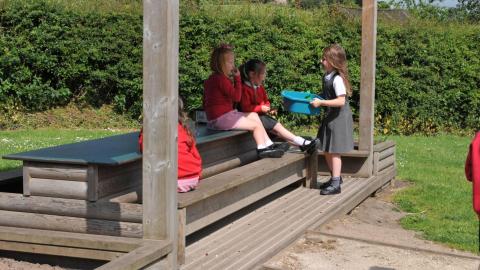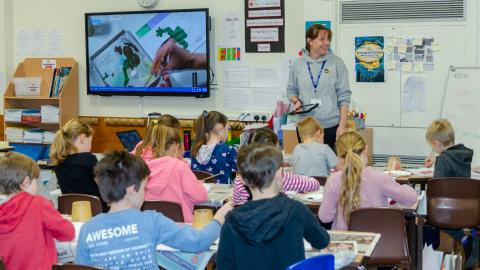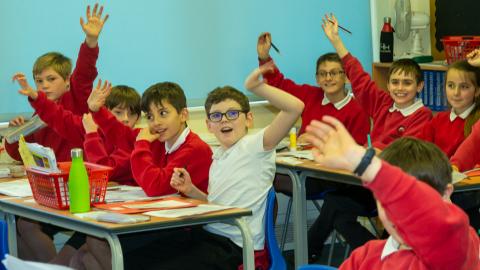Safeguarding and promoting the welfare of children is everyone’s responsibility. Everyone who comes into contact with children and their families and carers has a role to play. In order to fulfil this responsibility effectively, all professionals should make sure their approach is child-centred. This means that they should consider, at all times, what is in the best interests of the child. Keeping Children Safe in Education (KCSIE) DfE 2023 Safeguarding includes the establishment and implementation of procedures to protect children from deliberate harm, however, safeguarding also encompasses all aspects of pupils' health, and safety and well-being.
Safeguarding and promoting the welfare of children is defined as:
• Protecting children from maltreatment;
• Preventing impairment of children’s mental and physical health or development;
• Ensuring that children grow up in circumstances consistent with the provision of safe and effective care; and
• Taking action to enable all children to have the best outcomes. (Children includes everyone under the age of 18)
Key Contacts at Cononley Primary School
| Catherine Pickles | Designated Safeguarding Lead | headteacher@cononley.n-yorks.sch.uk |
| Katie Mason | Safeguarding Governor | katiemason@cononley.n-yorks.sch.uk |
| Jaki Fraser | Deputy Designated Safeguarding Lead | jfraser@cononley.n-yorks.sch.uk |
| Lucy Holmes | Deputy Designated Safeguarding Lead | lholmes@cononley.n-yorks.sch.uk |
Safeguarding Commitment
Cononley Primary School is committed to ensuring the welfare and safety of all children in our school. We will protect and support our vulnerable children, children who need support through early help, children in need and children who have a child protection plan. All North Yorkshire schools, including Cononley Primary School, follow the North Yorkshire Safeguarding Children Partnership procedures. Cononley Primary School will, normally, endeavour to discuss all concerns with parents or carers about their child or children. However, there may be exceptional circumstances when the school will discuss concerns with Social Care and/or the Police without parental knowledge (in accordance with Child Protection procedures and in line with Part 2 of KCSIE). Cononley Primary School will, of course, always aim to maintain a positive relationship with all parents. Cononley Primary School’s Child Protection Policy is available publicly via our website and paper copies can be requested from the school office: admin@cononley.n-yorks.sch.uk
Multi-agency working in North Yorkshire
Our school works in partnership with the North Yorkshire Safeguarding Children Partnership (NYSCP). Our school has a pivotal role to play in multi-agency safeguarding arrangements NYSCP, and contributes to multi-agency working in line with the statutory guidance ‘Working Together to Safeguard Children 2018’.
The three statutory safeguarding partners (North Yorkshire County Council, Health, and Police) have made arrangements to allow all schools and colleges in the local area to be fully engaged, involved and included in the new safeguarding arrangements. As a named as a relevant agency we are under a statutory duty to co-operate with the published arrangements.
THE SCHOOL IS AWARE OF AND WILL ALWAYS ACT IN LINE WITH THE NYSCP POLICIES AND PROCEDURES AND PRACTICE GUIDANCE
How We Keep Our Children Safe
Safeguarding includes the establishment and implementation of procedures to protect children from deliberate harm. Safeguarding also encompasses all aspects of pupils' health, safety and well-being. At Cononley Primary School, we have a number of policies and procedures to keep our pupils safe. An outline of these documents is listed below and can be read in full by clicking the links at the bottom of the page.
Child Protection and Safeguarding Training
Each year, staff and governors undertake child protection and safeguarding training so that we know the best way to keep our children safe. Here are links to some of the key documents and web-sites that we use to inform our practice:
Child Protection Policy - please see the link at the bottom of the page.
Keeping Children Safe in Education
What to Do if You are Worried a Child is Being Abused
Working Together to Safeguard Children
Prevent ( the duty to prevent people being drawn into terrorism)
Action Counters Terrorism (reporting suspicious behaviour that could be potentially related to terrorism)
Safer Recruitment
Safer recruitment is a set of practices to help make sure our staff and volunteers are suitable to work with children and young people. It's a vital part of creating a safe and positive environment and making a commitment to keep children safe from harm. At least one person who is interviewing for a new member of staff or volunteer will have undertaken recent Safer Recruitment training.
More Information about Safer Recruitment Training
Expectations for Staff, Volunteers and Governors
Staff, volunteers and governors are expected to uphold the highest standards of behaviour. These standards are made explicit through our Codes of Conduct and Responsible Use of ICT document; all staff, governors and volunteers are required to read and abide by these codes. There are procedures in place so that staff, volunteers and governors are able to report concerns about any aspect of safeguarding in school. All of these documents are linked below.
Related Policies and Procedures for Children
The ethos of our school underpins the way we promote the safety and wellbeing of all our children. There are high expectations for behaviour and clear policies for Behaviour and Anti-Bullying. Kindness and respect for each other are the key principles of our school rules. Through our curriculum, pupils are taught how to stay safe on-line and how to develop healthy relationships. Mental well-being is promoted and pupils are able to access support from school staff who have been trained through Compass Buzz. Pupils who require medication or adaptations for specific health needs or other special needs are welcomed and supported.




